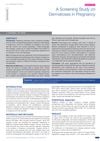 June 2022 in “International Journal of Health Sciences (IJHS) (En línea)”
June 2022 in “International Journal of Health Sciences (IJHS) (En línea)” Pregnant women with hair loss often have low zinc and iron levels.
 19 citations,
August 2000 in “International Journal of Dermatology”
19 citations,
August 2000 in “International Journal of Dermatology” Minoxidil and finasteride can slow or halt hair loss, but may have side effects.
 34 citations,
August 2003 in “Clinical and Experimental Dermatology”
34 citations,
August 2003 in “Clinical and Experimental Dermatology” Pregnant women's hair gets thicker.
 1 citations,
August 2021 in “Primary Care Diabetes”
1 citations,
August 2021 in “Primary Care Diabetes” Pregnant women with COVID-19 and gestational diabetes may face severe complications, and more research is needed on their outcomes.
 December 2017 in “Revista Brasileira de Saúde Materno Infantil”
December 2017 in “Revista Brasileira de Saúde Materno Infantil” Pregnant women with Systemic Lupus Erythematosus have a higher risk of blood clotting problems.
September 2018 in “Obsgyne Review Journal of Obstetric and Gynecology of Siddharth Health Research and Social Welfare Society” Pregnant women often experience a variety of skin problems, including pigmentation changes and stretch marks.
 January 2016 in “Dermatology Online Journal”
January 2016 in “Dermatology Online Journal” Pregnant women with blisters should be checked for bullous impetigo.
2 citations,
May 2018 in “PubMed” Pregnant women with isolated hypothyroxinemia face more health issues, so iodine and folic acid supplements are important before and during early pregnancy.
 51 citations,
February 2006 in “Clinics in Dermatology”
51 citations,
February 2006 in “Clinics in Dermatology” Pregnant women often experience skin and hair changes, with over half getting stretch marks and pigment changes, and should be cautious with cosmetic procedures due to potential risks.

Low vitamin D3 and ferritin levels may cause hair loss in pregnant women.
 January 2021 in “Systematic Reviews in Pharmacy”
January 2021 in “Systematic Reviews in Pharmacy” Pregnant women having their first child and those with multiple pregnancies experience different skin conditions.
February 2024 in “Biomedicines” Pregnant women with PCOS have higher levels of Neurokinin B in the placenta, especially with female babies.
 April 2017 in “International journal of current advanced research”
April 2017 in “International journal of current advanced research” Pregnant women often have skin changes, but only a small percentage have skin conditions caused by or specific to pregnancy; doctors need to tell them apart for proper treatment.
45 citations,
January 2016 in “Journal of Epidemiology and Global Health” Most pregnant women experience skin changes, with hyperpigmentation being the most common.
 December 2023 in “International journal of research in dermatology”
December 2023 in “International journal of research in dermatology” Most pregnant women experience common skin changes like linea nigra and stretch marks.
 36 citations,
April 1990 in “Dermatologic Clinics”
36 citations,
April 1990 in “Dermatologic Clinics” Most pregnant women experience skin changes like darkening and stretch marks, and some may have skin conditions that usually get better after giving birth.
 41 citations,
October 2017 in “International Journal of Women's Dermatology”
41 citations,
October 2017 in “International Journal of Women's Dermatology” Most pregnant women experience skin darkening and hair changes, with these effects usually going away after giving birth.
 January 2023 in “Our Dermatology Online”
January 2023 in “Our Dermatology Online” Most pregnant women experience skin changes, especially increased pigmentation.
 3 citations,
January 2018 in “Indian Dermatology Online Journal”
3 citations,
January 2018 in “Indian Dermatology Online Journal” Most pregnant women in Northeast India experience normal skin changes, with specific pregnancy-related skin conditions being rare.
 24 citations,
June 2011 in “International Journal of Dermatology”
24 citations,
June 2011 in “International Journal of Dermatology” Most pregnant women experience skin changes like darkening and itching, while serious skin conditions are rare but need early treatment.
 9 citations,
January 2017 in “Journal of Clinical and Diagnostic Research”
9 citations,
January 2017 in “Journal of Clinical and Diagnostic Research” Most pregnant women experience skin changes, mainly increased pigmentation, and some develop pregnancy-related skin conditions and infections.
 January 2016 in “Kafkas Journal of Medical Sciences”
January 2016 in “Kafkas Journal of Medical Sciences” Turkish pregnant women commonly experienced skin issues like itching and acne, and doctors mainly used topical treatments due to safety concerns during pregnancy.
 5 citations,
January 2014 in “International journal of gynaecology and obstetrics”
5 citations,
January 2014 in “International journal of gynaecology and obstetrics” HIV-positive pregnant women are more likely to experience severe bleeding, and a pregnant woman with familial hypertriglyceridemia had a successful early delivery with special care.

Proper care and understanding of skin diseases in pregnant women are crucial for their health and recovery.
 20 citations,
June 2012 in “Human Reproduction”
20 citations,
June 2012 in “Human Reproduction” Women with polycystic ovarian syndrome are more likely to have cervical insufficiency, especially South Asian and Black women.
 1 citations,
January 2018 in “PubMed”
1 citations,
January 2018 in “PubMed” Women with PCOS have a similar chance of getting pregnant using assisted reproductive treatment as those without PCOS.
5 citations,
May 2022 in “International Journal of Surgery Case Reports” Pericardiocentesis and immunosuppressants effectively treat cardiac tamponade in pregnant women with SLE.
180 citations,
October 2019 in “British journal of haematology” Early detection and treatment of iron deficiency in pregnancy are crucial for maternal and infant health.
 May 2024 in “Journal of trace elements in medicine and biology”
May 2024 in “Journal of trace elements in medicine and biology” Overweight or obese women before pregnancy have lower iron levels in their serum and hair during early pregnancy.

Self-monitoring blood pressure in pregnant women didn't improve outcomes, diabetes drugs may increase gallbladder disease risk, a new drug helps severe hair loss, a plant-based COVID-19 vaccine is 69.5% effective, and new anticoagulants are safer for diabetics with heart rhythm issues than warfarin.
























